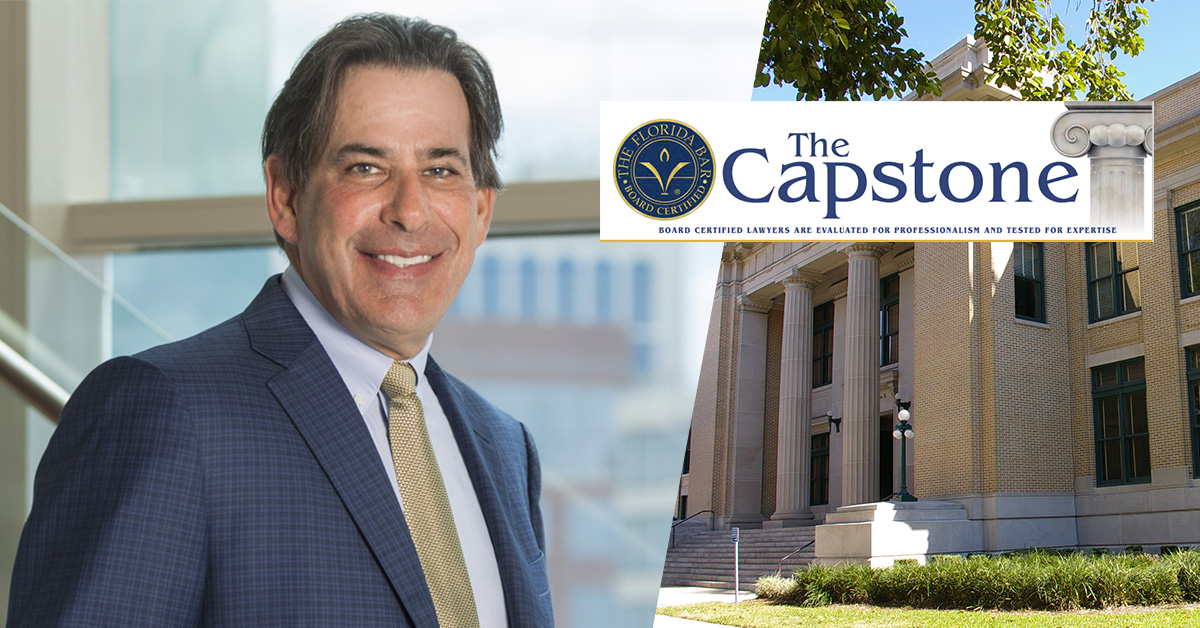“Why You Should Become A Board-Certified Lawyer” – The Capstone

The Florida Bar reports there over 93,000 lawyers eligible to practice law. Demand for legal services is on the rise as droves of out of state consumers and their businesses relocate to Florida. To meet this demand, law firms have aggressively been recruiting lawyers particularly in specialty areas such as real estate, construction, and corporate law. In the wake of these developments, lawyers can best position themselves to achieve success by becoming a board-certified specialist.
Board certification is administered by eight national private organizations with eighteen certification programs accredited by the American Bar Association. These private certification programs include specialty areas in bankruptcy, criminal trial advocacy, patent litigation, and complex litigation. Many state bar associations also administer board certification programs. For example, Florida has the largest number of certification specialty areas, at 27, which range from marital and family law to criminal law, construction, real estate, and workers’ compensation. Board certification is Florida’s official, independent determination of a lawyer’s expertise to practice in a specialty area of law. As noted on its website, “It is the gold standard for Florida lawyers, representing a recognition by a lawyer’s peers that they have attained a level of professional expertise in their chosen field”. Florida’s slogan for board certification is “Evaluated for Professionalism and Tested for Expertise.” In Florida, only less than 6% of all Florida lawyers are board certified specialists.
In Florida, the board-certified designation will allow you to advertise as a board-certified specialist. This designation can be important to potential clients because selecting a board-certified lawyer provides an assurance of the lawyer’s expertise. This is the case for several reasons. Generally, all certifying programs require a lawyer to have practiced with substantial involvement in a specialty area for at least five years and pass a rigorous examination testing their knowledge of the law in the specialty area. A board[1]certified lawyer must also be vetted by their peers for professionalism and ethics through a confidential peer review process. In addition, most candidates must satisfy a continuing education requirement in a designated specialty area. Typically, board-certified lawyers must apply to be recertified every five years and through that process, must demonstrate compliance with all board certification requirements.
Becoming board certified can foster confidence in your everyday practice because a board-certified lawyer is required to be up to date on current developments and legislation that impacts their legal specialties. For example, with constantly evolving business technologies and systems, lawyers who are board certified in Privacy Law by the International Association of Privacy Professionals (IAPP) are on top of emerging privacy legislation on state and global levels. In a legal landscape where fewer cases are actually tried to verdict, lawyers board certified in Complex Litigation by the National Board of Trial Advocacy (NBTA) have, at a minimum, actively participated in one hundred contested matters, and NBTA lawyers board certified in Criminal Law have extensive jury trial experience and significant experience dealing with expert witnesses. Lawyers board certified in Business Bankruptcy Law by the American Board of Certification (ABC) must participate in at least thirty adversary proceedings or contested matters across a range of business areas. Thus, board-certified lawyers have focused legal acumen that is demonstrated and tested on a regular basis.
Becoming a board-certified specialist has appeal for a number of other reasons beyond proven competency. Lawyers that practice in a specific specialty area tend to know their colleagues on the opposing side. This type of knowledge and familiarity can be of assistance in amicably resolving disputes that could otherwise wind up in drawn-out, expensive litigation. The greatest benefit to becoming board certified is that studying for the examination and satisfying applicable continuing legal education requirements will make you a better lawyer. In addition, it will positively distinguish your qualifications from other lawyers outside your firm as well as those practicing within your firm.
More information about board certification can be acquired from the Florida Bar’s website and by consulting the American Bar Association Standing Committee on Specialization’s website for more information on board certification, specialty areas, and links to the national private organizations with ABA-accredited certification programs and states that run their own certification programs throughout the country. The ABA has been involved with board certification of lawyers for almost thirty years, and ABA accreditation is widely recognized as a valuable seal of approval for organizations conferring board certification. Additionally, the ABA has worked with states on incorporating ABA Model Rule 7.2 (formerly 7.4) into state ethics codes, and many states permit certified specialists to publicly disclose certification without any limitation if they are certified by a program that is accredited by the ABA.
To read the print version, click here.
Steven B. Lesser is a Shareholder and Chair of the Firm’s Construction Law & Litigation Practice. Mr. Lesser is Florida Bar Board Certified in Construction Law and Chair of the American Bar Association Standing Committee on Specialization.
Reprinted with permission from the September 14, 2022, online edition of the Daily Business Review © 2022 ALM Global Properties, LLC. All rights reserved.





